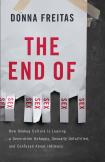Save Yourself
In The End of Sex, Donna Freitas, through the use of broad surveys and personal interviews, unravels the culture in which students in colleges and universities live and that has a pervasive claim on their lives. It is a monolithic culture based on gender hierarchy fueled by the porn culture, where men take the positions of power and women the roles of subservience. Women are treated more like props than partners and are valued only for their sexual service to satisfy male pleasures. In this culture, sex is instrumentalized and persons are commodified. Fast, unthinking and uncaring, sex is bereft of any emotional content or personal commitment.
Maintained and perpetuated by unrestrained consumption of alcohol, students get themselves wasted and thrashed for the goal of “hooking up.” Without alcohol, they could not claim lack of responsibility for their actions. The hookup culture is dominant, as it defines the norm that determines the social status of students. Those who are not part of it do not belong. They are rejected, ostracized and marginalized.
But for all their public claims about the social capital of belonging, students are deeply and profoundly wounded, to judge by Freitas’s personal interviews, in which they speak truthfully—contrary to their public posturing and pretensions. The oppression of hookup culture leaves many of them feeling abused, demeaned and degraded. While some are able to break out of the culture, others seem to see no alternative way to survive the dark complexities of college life.
Freitas raises the critical question of why the hookup culture is able to survive in colleges and universities, the centers of intellectual inquiry and cultural critique, where students are taught to critically examine the world around them. While she sees the ubiquitous porn culture, the cultural obsession with celebrity and pop stars and the massive influence of television, movies and technology at the base of the hookup culture, she claims that colleges and universities play a role in its perpetuation.
The mission statements of colleges and universities are far removed from the hookup culture that is claiming the minds and hearts of students. This culture is not directly and critically engaged, and at best colleges and universities teach students only how-to’s for protecting themselves from sexually transmitted diseases and pregnancy as well as for preventing sexual assault. This is usually done during an orientation talk about sex that is given only once and in many cases lasts only an hour.
Freitas sees these how-to talks as indirectly perpetuating the notion that everything is about having sex in college and hooking up is the norm, and that the primary thing that students need to know is how to protect themselves from its negative consequences. The students, however, are left to struggle on their own against the oppression of this culture in their lives without the support and resources to respond in ways that are empowering and transforming.
The students in the classrooms are different from the persons they are transformed into on weekend nights. They live double lives. While hookup happens on the weekends, it cannot be walled off from the rest of their lives. What they do with their bodies, they do with their minds, hearts and souls. The porno culture that shapes the worldview of hookup has entered the interior world of the students and their value systems. Freitas claims that many students yearn for mature and rigorous conversation on issues regarding the hookup culture, which she says must be done in their academic courses. She herself recommends reclaiming the conversation on virginity and abstinence and re-envisioning it for more moderate views.
Frietas upholds the view of temporary abstinence as a subversive and profoundly effective tool that, when practiced, might lead students to “good sex” when they decide they are ready for it.
Nevertheless, while it is always good for students to practice abstinence for their well-being, the assault of the hookup culture cannot be confronted with tools and strategies alone. It has cut deep into the interior world of the students, and it must be addressed at the same deep level—where questions of identity, meaning and purpose must be reckoned with. We must offer them an alternative world view with its expanse, depth, beauty and sublimity in the face of hook up culture. It must offer them a grand narrative of life that provides them the inner resources to respond to the depth questions: Who am I? What kind of person do I seek to become? What is the meaning of my existence?
This article also appeared in print, under the headline “Save Yourself,” in the July 1-8, 2013, issue.








